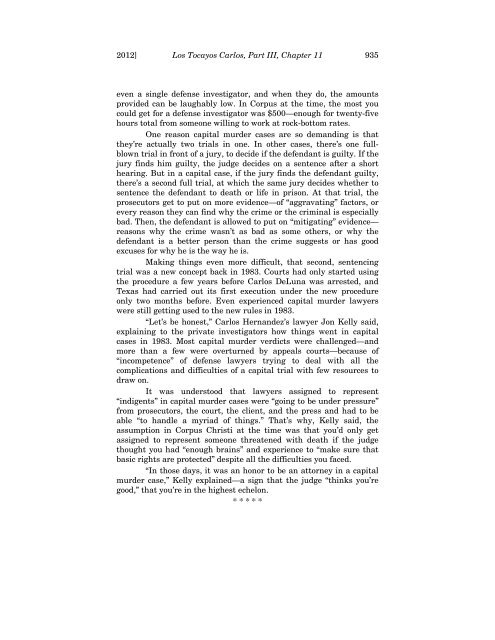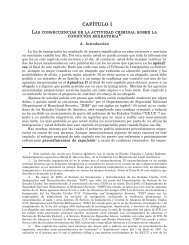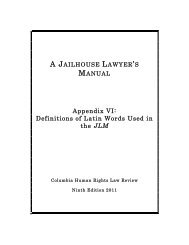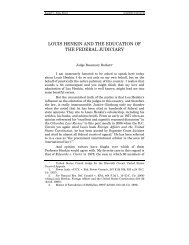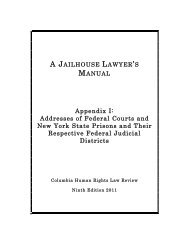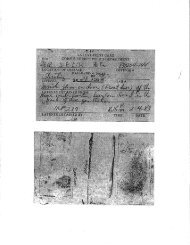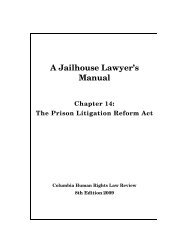Hector De Peña was the first lawyer assigned to defend Carlos ...
Hector De Peña was the first lawyer assigned to defend Carlos ...
Hector De Peña was the first lawyer assigned to defend Carlos ...
Create successful ePaper yourself
Turn your PDF publications into a flip-book with our unique Google optimized e-Paper software.
2012] Los Tocayos <strong>Carlos</strong>, Part III, Chapter 11 935<br />
even a single defense investiga<strong>to</strong>r, and when <strong>the</strong>y do, <strong>the</strong> amounts<br />
provided can be laughably low. In Corpus at <strong>the</strong> time, <strong>the</strong> most you<br />
could get for a defense investiga<strong>to</strong>r <strong>was</strong> $500—enough for twenty-five<br />
hours <strong>to</strong>tal from someone willing <strong>to</strong> work at rock-bot<strong>to</strong>m rates.<br />
One reason capital murder cases are so demanding is that<br />
<strong>the</strong>y’re actually two trials in one. In o<strong>the</strong>r cases, <strong>the</strong>re’s one fullblown<br />
trial in front of a jury, <strong>to</strong> decide if <strong>the</strong> <strong>defend</strong>ant is guilty. If <strong>the</strong><br />
jury finds him guilty, <strong>the</strong> judge decides on a sentence after a short<br />
hearing. But in a capital case, if <strong>the</strong> jury finds <strong>the</strong> <strong>defend</strong>ant guilty,<br />
<strong>the</strong>re’s a second full trial, at which <strong>the</strong> same jury decides whe<strong>the</strong>r <strong>to</strong><br />
sentence <strong>the</strong> <strong>defend</strong>ant <strong>to</strong> death or life in prison. At that trial, <strong>the</strong><br />
prosecu<strong>to</strong>rs get <strong>to</strong> put on more evidence—of “aggravating” fac<strong>to</strong>rs, or<br />
every reason <strong>the</strong>y can find why <strong>the</strong> crime or <strong>the</strong> criminal is especially<br />
bad. Then, <strong>the</strong> <strong>defend</strong>ant is allowed <strong>to</strong> put on “mitigating” evidence—<br />
reasons why <strong>the</strong> crime <strong>was</strong>n’t as bad as some o<strong>the</strong>rs, or why <strong>the</strong><br />
<strong>defend</strong>ant is a better person than <strong>the</strong> crime suggests or has good<br />
excuses for why he is <strong>the</strong> way he is.<br />
Making things even more difficult, that second, sentencing<br />
trial <strong>was</strong> a new concept back in 1983. Courts had only started using<br />
<strong>the</strong> procedure a few years before <strong>Carlos</strong> <strong>De</strong>Luna <strong>was</strong> arrested, and<br />
Texas had carried out its <strong>first</strong> execution under <strong>the</strong> new procedure<br />
only two months before. Even experienced capital murder <strong>lawyer</strong>s<br />
were still getting used <strong>to</strong> <strong>the</strong> new rules in 1983.<br />
“Let’s be honest,” <strong>Carlos</strong> Hernandez’s <strong>lawyer</strong> Jon Kelly said,<br />
explaining <strong>to</strong> <strong>the</strong> private investiga<strong>to</strong>rs how things went in capital<br />
cases in 1983. Most capital murder verdicts were challenged—and<br />
more than a few were overturned by appeals courts—because of<br />
“incompetence” of defense <strong>lawyer</strong>s trying <strong>to</strong> deal with all <strong>the</strong><br />
complications and difficulties of a capital trial with few resources <strong>to</strong><br />
draw on.<br />
It <strong>was</strong> unders<strong>to</strong>od that <strong>lawyer</strong>s <strong>assigned</strong> <strong>to</strong> represent<br />
“indigents” in capital murder cases were “going <strong>to</strong> be under pressure”<br />
from prosecu<strong>to</strong>rs, <strong>the</strong> court, <strong>the</strong> client, and <strong>the</strong> press and had <strong>to</strong> be<br />
able “<strong>to</strong> handle a myriad of things.” That’s why, Kelly said, <strong>the</strong><br />
assumption in Corpus Christi at <strong>the</strong> time <strong>was</strong> that you’d only get<br />
<strong>assigned</strong> <strong>to</strong> represent someone threatened with death if <strong>the</strong> judge<br />
thought you had “enough brains” and experience <strong>to</strong> “make sure that<br />
basic rights are protected” despite all <strong>the</strong> difficulties you faced.<br />
“In those days, it <strong>was</strong> an honor <strong>to</strong> be an at<strong>to</strong>rney in a capital<br />
murder case,” Kelly explained—a sign that <strong>the</strong> judge “thinks you’re<br />
good,” that you’re in <strong>the</strong> highest echelon.<br />
* * * * *


